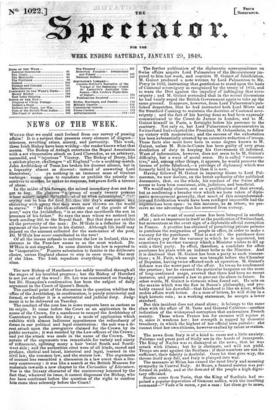The further publication of the diplomatic correspondence on Swiss affairs
acquits Lord Palmerston of thelhconsistency im- puted to him last week, and convicts M. Guizot of falsification. M. Guizot produced a note written by Lord Palmerston to Mr. Percy in 1832, instructing that gentleman to stand upon the basis of Cantonal sovereignty as recognized by the treaty of 1815, and to warn the Diet against the impolicy of infringing that sove- reignty; and M. Guizot pretended that in the recent discussions he had vainly urged the British Government again to take up the same ground. It appears, however, from Lord Palmerston's pub- lished despatches, that he had instructed both Lord Minto and Sir Stratford Canning to maintain the doctrine of Cantonal sove- reignty ; and the fact of his having done so had been expressly communicated to the Count de Jarnac in London, and to M. Guizot himself in Paris, a fortnight before his pretence to the contrary. Not only so, but Lord Palmerston's representative in Switzerland had exhorted the President, M. Ocbsenbein, to follow up victory with moderation ; and the success of the exhortation has been substantially attested by an extensive reduction of troops. These facts also must have been in some degree known to M. Guizot, unless M. Bois-le-,Comte has been guilty of very gross dereliction of duty in keeping his Government ill informed. Want of information, however, does not seem to be M. Guizot's difficulty, but a want of moral sense. He is called " conserva- tive," and, among other things, it appears, he would preserve the licence of polite falsehood,—a privilege of diplomacy which was formerly held in higher esteem than it is now. Having followed M. Guizot in imputing blame to Lord Pal- merston, we now declare, on the better authority of the published documents, that, on the whole, his conduct of the Swiss affair seems to have been consistent, able, judicious, and beneficial. We wouldasnly observe, not as a 9ualification of that avowal, but as confirming a broader view which we have taken of diplo- .
'static management generally, that much of this misunderstand- w ma falsification would have been rendejed impossible had the lallttintions been open : in this instances as others, we per- ceive no one advantage that has accrued from secrecy.






















